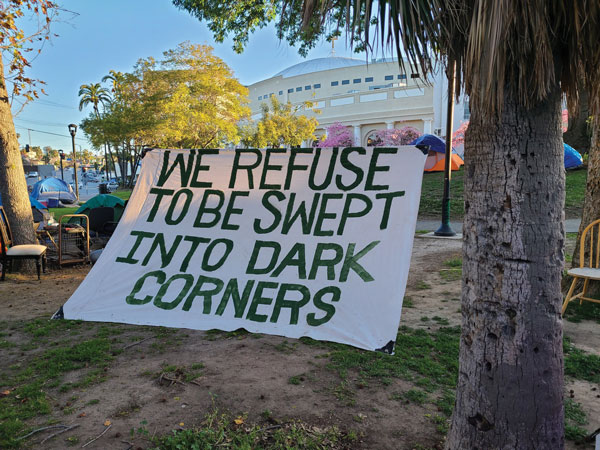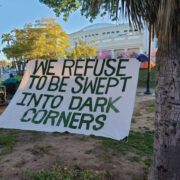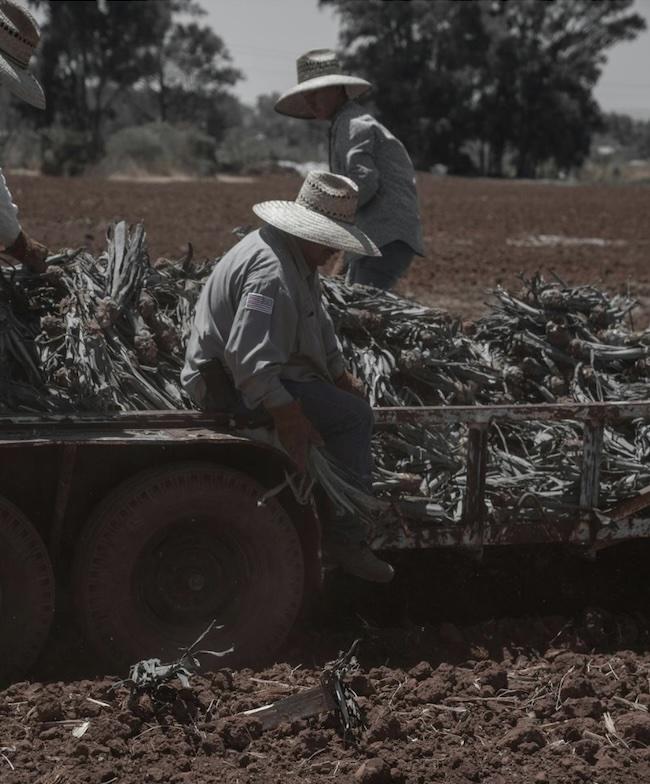
AS the City of Los Angeles moves towards excavating the homeless encampments at Echo Park Lake this week, hundreds of homeless residents and advocates continue to push back on the decision, leading to two nights of demonstrations and calls into concern the issue of extreme force by police.
This week, LA City officials — including Councilmember Mitch O’Farrell of the 13th District, which includes the park, and who made the ultimate decision — began rushing to get rid of homeless encampments in the beloved Echo Park Lake and moving unhoused people into transitional housing.
The plan was to close the park on Wednesday, March 24 but details of the plan were initially kept secret to avoid inspiring large protests, similar to one last year when the city attempted a massive cleanup of the park.
But reports in the LA Times with anonymous sources close to the project leaked, leading to hordes of homeless individuals, students and activists gathering at Echo Park Lake and the adjacent areas on Wednesday night to protest the cleanup and removal of homeless residents.
Those who attended the protests were faced with about 400 Los Angeles Police Department (LAPD) officers who enforced 10:30 p.m. curfews on both nights in order for the city to start the cleanup.
The demonstrations started off peaceful but according to the LAPD, protestors used “high-intensity lights” to try to blind officers. This prompted a declaration of unlawful assembly near Lemoyne Street and Park Avenue around 8:10 p.m. on Thursday night and a designated protest zone on Glendale Boulevard and Park Avenue was set up.
But the demonstration turned violent when police began firing non-lethal rubber rounds to break up the crowd of protestors and several demonstrators were arrested on the site on Thursday night.
Filipino American demonstrator Julia Lu attended both nights of protests and saw firsthand how the violence began.
“It’s not shocking the LAPD used force against us but it’s still stunning because none of [the demonstrators] were using force against the police,” Lu said in a phone call with the Asian Journal on Friday, March 26. “We linked arms with one another as a way of protecting ourselves, and the next thing I remember was hearing shots several feet ahead of me and everybody just scattered after that.”
As of Friday, March 26, a little more than a dozen protestors were arrested, including four members of the media.
O’Farrell released a statement encouraging residents to practice “calm and cooperation” in their demonstrations and added that “almost 200 of the park’s unhoused population has accepted and been placed in shelter options” through the various transitional housing projects through the LA Housing Services Authority (LAHSA).
Kenneth Mejia, a Filipino American CPA who is running for LA city comptroller in 2022, attended the demonstration and criticized the huge “police presence and militarized occupation” of Echo Park Lake as well as the city’s mishandling of the homeless issue, historically and presently.
“It is never okay to criminalize poverty,” Meija told the Asian Journal in an email. “Many of the hotel rooms being offered now through Project Room Key are temporary and have strict restrictions such as a 7 p.m. curfew. Our unhoused neighbors need to be treated with dignity [and] respect and have a seat at the table when it comes to working solutions for them.”
As of press time, the cleanup — and the additional $500,000 worth of repairs needed in the aftermath of the protests — is still a go despite massive outrage across the city.
But some residents feel that the park is “unsafe” and the homeless encampments pose a serious safety issue for park-goers and those who live adjacent to the park.
Annie Lee, a Filipino and Chinese American resident of the adjacent Silver Lake neighborhood, regularly frequents Echo Park Lake to walk her dog and spend time with her family, but “for years” she’s felt that it’s not safe “for a lot of people.”
“I don’t mean to disrespect people who are homeless, but walking through the park does feel unsafe and I think the city needs to work on improving the conditions,” Lee told the Asian Journal in a phone interview, adding that she does feel that the ramping homeless issue in the park “may” be directly connected to the park’s long standing “unsanitary and unhygienic” state.
“My issue is cleanliness and violence and assaults that we have seen recently,” Lee said referencing the string of violence that occurred in the area late last year.
In a report in The Eastsider, there were at least three assaults with a deadly weapon that occurred near the intersection of Glendale Boulevard and Park Avenue in the northeast corner of Echo Park Lake on Nov. 28, Nov. 30 and Dec. 1. There were no reported fatalities and while one of the incidents involved no firearms, two of the incidents were shootings.
According to the LAPD, the witnesses and victims “were all transients,” Det. Craig Marquez of the LAPD’s Rampart Division said, as quoted by The Eastsider.
Those three incidents may have expedited the long-awaited plan to revamp Echo Park Lake, of which some residents see as part of the city’s campaign to gentrify areas historically occupied by communities of color and low-income residents.
For Linette Gonzales, a lifelong Angeleno and resident of Echo Park for 15 years, the arguments for public safety are flimsy.
“Echo Park Lake is already beautiful and my fear is that this effort to repair the park is unnecessary and it’s veiled gentrification, which is kicking out people who’ve lived here for years,” Gonzales told the Asian Journal via email, who added that perceptions about the homeless community also play into what she calls a “false equivalence” between homelessness and sanitation issues.
She also remarked that she thinks that perceptions about race play into public opinion and attitudes regarding homeless. Asian Americans and Pacific Islanders (AAPI) are among the least likely groups to experience homelessness, according to a 2019 report from the LAHSA.
But to Gonzales, that “doesn’t mean we should turn a blind eye to these people.”
Moreover, she feels that the negative opinions about homeless people coincide with anti-Blackness.
“I don’t think that there’s a coincidence between the way many people — especially Filipinos — feel about homeless people and the antiblack tendencies that run strongly in our community,” said Gonzales, who is a social worker.
“Our parents teach us to lock our car doors if we see a homeless person nearby, and there’s an increased fear when it’s a Black homeless person,” she said. “But this equating violence or harassment with all homeless people is so wrong.”
According to a recent report from the LAHSA indicated that institutional racism plays a key role in the extreme overrepresentation of people of color who experience homelessness.
A U.S. Census survey and report from the U.S. Dept. of Housing and Urban Development show that in California, the Black or African American community make up about 6.5% of the population, but they account for almost 40% of the state’s homeless population.
In the last four years, LA County’s Black homeless population has increased by 22%.
Gonzales added that homelessness is “a very layered issue that is directly connected to income inequality, access to quality education, criminal justice, health care and job opportunities.”
“It doesn’t exist in a vacuum, right? How do people become homeless? The shame of homelessness doesn’t fall on those who are homeless; that shame falls on the part of our leaders, law enforcement and city government which, for so long, [have] failed their homeless constituents,” she shared. (Klarize Medenilla/AJPress)







